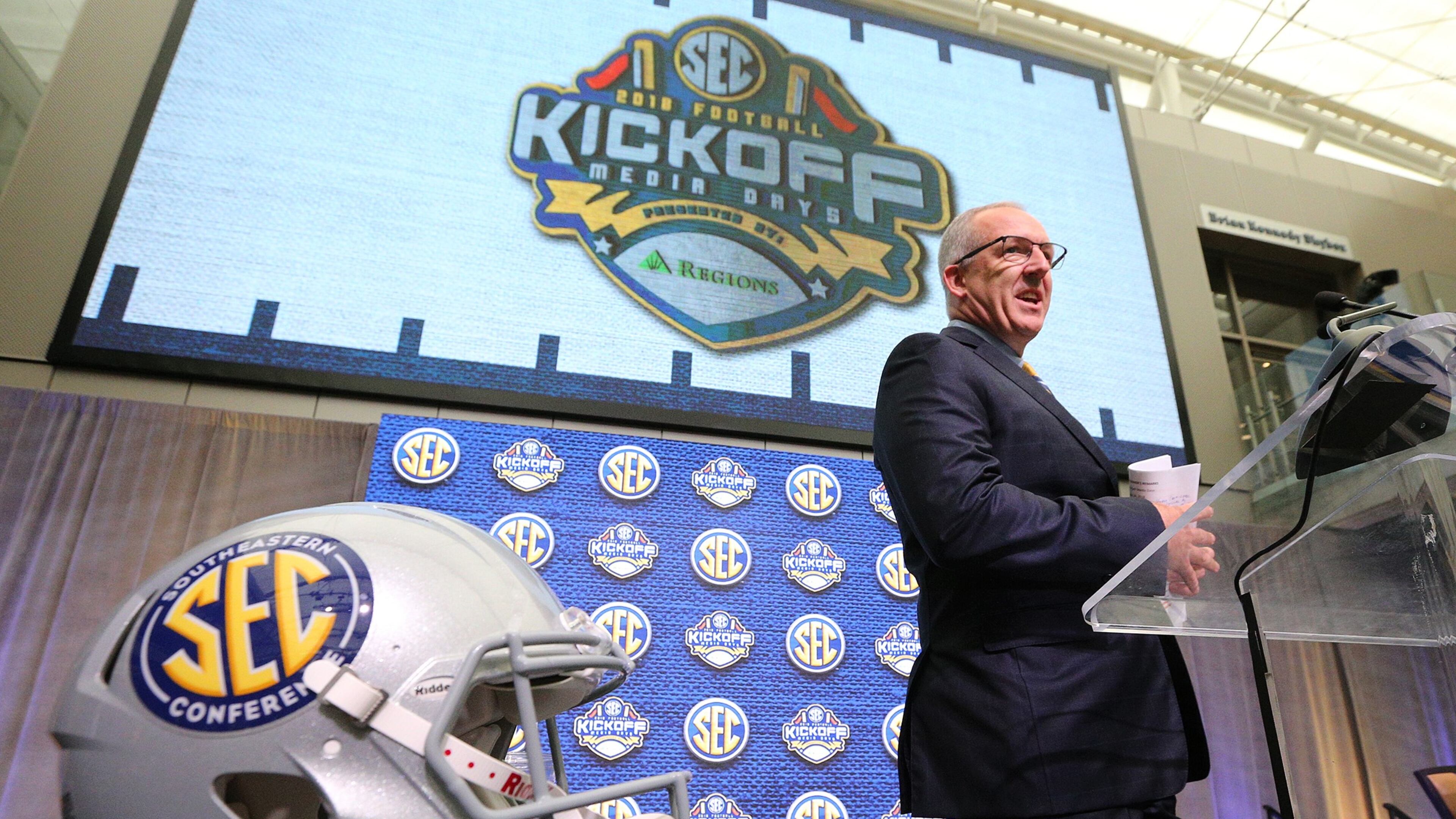The SEC has no intention of stopping soon

The week has been awash in domino theory, the first draft of which read thusly: If the Big Ten said it wasn’t playing college football in 2020, the Pac-12 would do the same, thereby leaving the remaining Power Five leagues no choice but to pull out.
Reality check: The Big Ten and Pac-12 have indeed removed themselves; the SEC, ACC and Big 12 have said they plan to play. Which brings us to:
Domino theory, Take 2: If the Big 12 buckled – there was thought it might, though the league announced Wednesday it plans to play and released a redone schedule – the ACC would likely follow. Had that happened (and it still could), it would leave the SEC, like the cheese, standing alone, and surely no single conference could manage that.
To which we say, again: Not so fast, my friend.
The SEC wants to play football. The SEC believes its testing protocols offer the realistic chance, or as realistic as chances can be, of playing football. There could well come a day when the SEC says, “We can’t make this work.” That day remains a ways away. And that day, should it come, won’t be tied to what any other conference does or does not do.
Not to belabor our stirring farmer-in-the-dell imagery, but the SEC sees itself as the biggest of cheeses. (It Just Means More, y’know?) Initial reports held that the Big Ten would vote 12-2 to cancel/postpone the season, with only Iowa and exceedingly whiny Nebraska in disagreement. The Pac-12 vote was unanimous.
Were the SEC to hold a straw ballot today – it’s nowhere close to a real vote – the guess is that it would be 13-1 in favor of playing. (I’m saying “1″ because there’s always Vanderbilt.) As much as we on the periphery might believe that an autumn without college football is inevitable, the SEC feels no urge to concede. Indeed, there’s belief within the Just-Means-More league that the Big Ten/Pac-12 Just Wimped Out.
If that sounds unduly harsh … well, welcome to these polarized United States. Of the 11 states with SEC members, nine have Republican governors. (Exceptions: Louisiana and Kentucky.) Of the Pac-12′s members, nine are based in states governed by Democrats; of the Big Ten’s 14 members, eight are similarly situated. The SEC is therefore under no pressure from above to call this off; on the contrary, the loudest political voices are urging their schools to keep going.
That doesn’t mean the SEC should play just because elected officials – and a goodly chunk of the electorate – demand football. It does mean that the SEC can afford to wait without being hooted down, at least not locally, as a mercenary enterprise that cares nothing about the welfare of its student-athletes.
Toward that end, the SEC did a wise thing: It moved its kickoff date from Labor Day weekend to Sept. 26. This was reflected in commissioner Greg Sankey’s tweet Monday: “Best advice I’ve received since COVID-19: ‘Be patient. Take time when making decisions. This is all new & you’ll gain better information each day.’ "
Chances are, the COVID data will look no more encouraging a month from now. But the SEC bought itself time the Big Ten, for reasons unknown, did not. That league announced last week its intention to open Sept. 5. Six days later, it canceled the season. What was the thinking there?
The SEC plans to keep going until something makes it stop. (From Sankey: “Can we play? I don’t know. We haven’t stopped trying.”) It would be no great surprise if the SEC keeps going after the Big 12 and ACC decide they cannot. The Just-Mean-More folks wouldn’t mind some company – there might still be a three-league College Football Playoff – but the SEC believes its protocols can and will offer the chance of getting through 10 regular-season games, and maybe one more.
“Even if we just play for the SEC championship,” one conference higher-up told this correspondent, “that’s still a championship for our players.”
This correspondent’s opinion hasn’t changed since March: In a pandemic, sports are unnecessary and, in the case of a full-contact sport, potentially injurious to the health of its participants. The Big Ten made a big deal of its fear of COVID-triggered myocarditis, an inflammation of the heart muscle. But, as we know too well, medical opinions are subject to heated debate. Indeed, a Duke infectious disease specialist told Sports Business Daily he believes it’s safe to play football. (Duke’s in the ACC, I do believe.)
The SEC is not ignoring medical advice. It is, however, viewing such advice through the prism of, “Is this still do-able?” Once more, with feeling: The SEC really, REALLY wants to play.
Do I believe Sankey and the league presidents and ADs would agree to something that has no hope of working and the distinct possibility of harming? No, I do not. These are not evil people. I believe the conference will do what’s right for players who are, after all, amateurs. I believe what’s right would be not to play.
That said, I won’t rip the conference for holding open all options. It can stop anytime between now and Sept. 26. Once you’ve said, “We’re done,” you’re done. I expect the SEC will eventually reach a stopping point. I also expect it will be the last major conference to get there.

